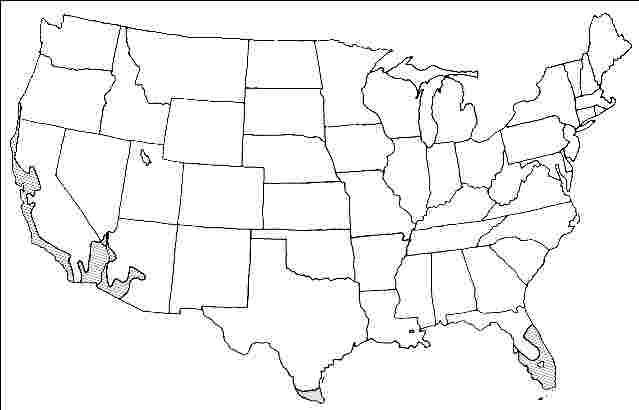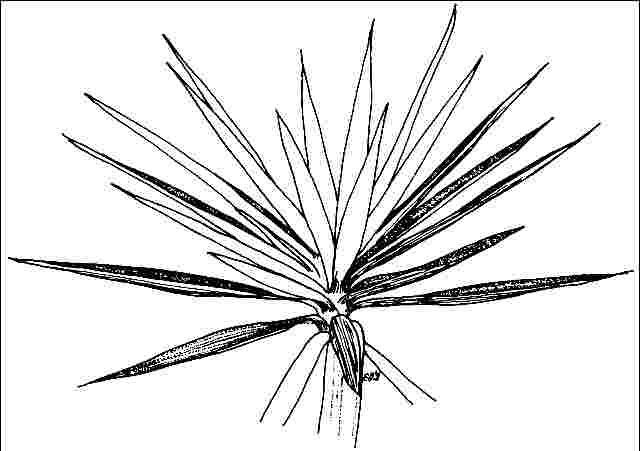Introduction
A dramatic landscape element, spineless yucca is the tallest of the Yuccas, reaching 30 feet in height with a 15-foot spread, its single, thick, rough trunk topped with straplike, four-foot-long leaves. Variegated spineless yucca differs from the species only in the variegated, stripped leaf pattern. The trunk can grow to four-feet-thick. Sprouts often grow from the base of the trunk forming a multi-trunked tree. Spineless yucca grows fairly rapidly but usually stays under 20 feet in height, and is ideal for use in succulent gardens or large planters. Unlike its close relative, Spanish bayonet, spineless yucca can be used in close range of people since it lacks the formidable, terminal spine and has harmless leaves. It was introduced into Florida in 1956 as a substitute for the spiny Spanish bayonet.

Credit: UF/IFAS
General Information
Scientific name: Yucca gigantea
Pronunciation: YUCK-uh jie-GAN-tee-uh
Common name(s): Variegated Spineless Yucca, Variegated Soft-Tip Yucca
Family: Agavaceae
USDA hardiness zones: 9B through 11 (Figure 2)
Origin: not native to North America
Invasive potential: not considered a problem species at this time, may be recommended (North, Central, South)
Uses: indoors; deck or patio; specimen; container or planter; highway median

Credit: UF/IFAS
Description
Height: 20 to 30 feet
Spread: 10 to 15 feet
Crown uniformity: irregular
Crown shape: upright/erect
Crown density: open
Growth rate: fast
Texture: coarse
Foliage
Leaf arrangement: alternate (Figure 3)
Leaf type: simple
Leaf margin: entire
Leaf shape: lanceolate, linear
Leaf venation: parallel
Leaf type and persistence: evergreen
Leaf blade length: more than 36 inches
Leaf color: variegated
Fall color: no color change
Fall characteristic: not showy

Credit: UF/IFAS
Flower
Flower color: white/cream/gray
Flower characteristics: showy
Fruit
Fruit shape: oval
Fruit length: 0.5 to 1 inch
Fruit covering: fleshy
Fruit color: brown
Fruit characteristics: does not attract wildlife; not showy; fruit/leaves not a litter problem
Trunk and Branches
Trunk/bark/branches: branches don't droop; showy; typically multi-trunked; thorns
Pruning requirement: needed for strong structure
Breakage: resistant
Current year twig color: green
Current year twig thickness: very thick
Wood specific gravity: unknown
Culture
Light requirement: full sun, partial sun or partial shade
Soil tolerances: clay; sand; loam; alkaline; acidic; well-drained
Drought tolerance: high
Aerosol salt tolerance: moderate
Other
Roots: not a problem
Winter interest: no
Outstanding tree: no
Ozone sensitivity: unknown
Verticillium wilt susceptibility: unknown
Pest resistance: resistant to pests/diseases
Use and Management
The two to three-foot-tall bloom is produced on top of the stalks once the plant is 8 to 10 feet tall. Blooms are edible and high in calcium and potassium and can be used in salads. Leaves contain large amounts of ascorbic acid.
Spineless yucca grows easily in full sun or partial shade on any well-drained soil. Do not plant Yucca unless drainage is superior. Yucca grows well as a houseplant in a well-lighted area.
Propagation is by cuttings of any size. Suckers at the base of the plant root quite easily.
Pests
Pests include yucca moth borers, scale, and black weevil which bore into roots and stems.
Diseases
No diseases are of major concern, except root rot in soils kept too moist. Do not irrigate Yucca. Leaf spots sometimes infect Yucca but do no real harm to the plant.